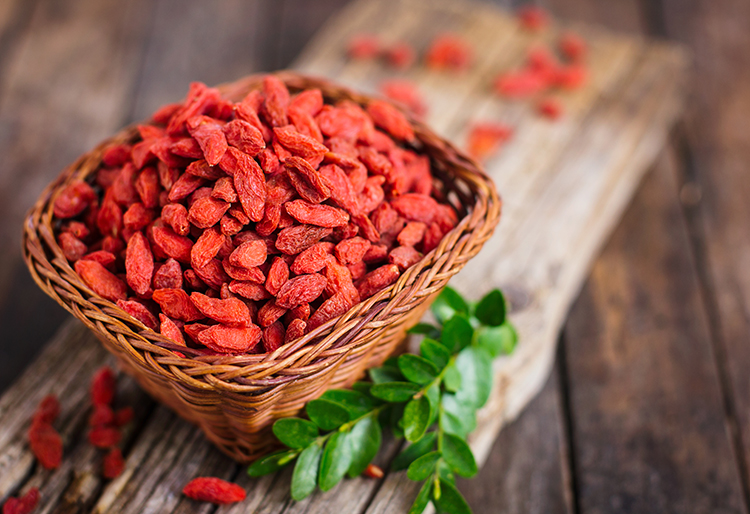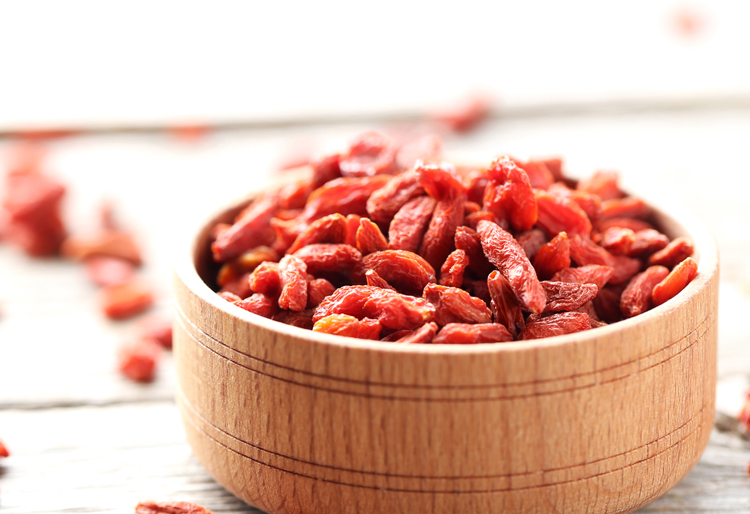Goji Berries: properties and benefits
Goji berries are a very popular food in China and other regions along the mountainous chain of the Himalayas. The fruits are attributed with a large variety of benefits: stimulating the immune system, antioxidant properties, anti-inflammatory effect, and improving the digestion, among others.
fresh food
Share

Goji berries – sometimes called Goji cherries – are small, oval-shaped, orange-red fruits, with a slightly wrinkled skin. These berries originate from the botanical species Lycium barbarum and Lycium tibeticum, two plants with long branches which are native to the Asian continent. Normally they are eaten dried, hence the texture of their skin and their easy storage.
The people of the Himalayas know this fruit well, and it has formed part of their traditional diet for more than 4500 years, as evidenced in their ancient writings. The inhabitants of this steep mountainous region attribute the berries with many beneficial properties which contribute to a prolonged life expectancy.
Despite originating in Asia, they are grown commercially in Northern Chile. The fertile soils around Santiago compete with China for the bulk of global production, some of which also takes part in the south-east of Spain, in the regions of Almería, Murcia and Alicante, although in these Spanish provinces the fruit is known as cambrón and its bushes are used as natural hedges in the countryside.
The harvesting process for the berries is particularly delicate. Once the fruits have ripened on the bush, they are picked in a natural way with the utmost of care. When the fruits have been picked, they are exposed to the sun to dry or are dried using modern mechanical processes.
Nutritional value of the Goji berry
Among the nutritional substances contained in Goji berries, there are 18 amino acids, among them 8 essential amino acids. They are rich in minerals, such as calcium, phosphorus and potassium. They also contain copper, nickel, chromium, manganese, cobalt, selenium, cadmium and germanium, and some oligo-elements which are necessary in small doses for the functioning of our body. Their striking colour is indicative of the antioxidants that the berries contain particularly the beta-carotenes that help our immune system to protect itself from many diseases, and which aid the production of red blood cells. Vitamins A, B1, B2, B6, C and E are also present in the berries, as are the essential fatty acids omega 3 and omega 6.
You need to pay attention to the calories contained in these tiny fruits, as they contain more calories than other berries or fresh fruits, so you should not eat too many if you are reducing your daily calorie intake.
The composition of the la Lycium barbarum fruit, per 100 grams, can be summed up as:
- 268 calories
- 48,8 g carbohydrates
- 15 g protein
- 14.9 g fibre

A berry that is good for your health
It is said that Goji berries have a stimulating effect on the HCH hormone, which is the hormone responsible for human growth. This hormone also aids cellular regeneration, boosts memory and helps to improve the quality of your sleep. HCH contributes to fixing calcium in your bones and maintains muscular tissue, as well as reducing less beneficial body fat. The zeaxanthins, a chemical compound within the fruit’s pigment, are beneficial for human vision, as their antioxidant power can prevent negative macular changes.
How to use Goji berries
Goji berries can be eaten in many more ways than you would imagine: on their own as a quick energy snack, added to shakes and smoothies, with yogurt, in a healthy and comforting porridge or as an original touch to salads or vegetable rice. They can also be used in classic baking recipes, such as sponges, Madeleines, muffins or cookies.
During the hotter months of the year, Goji berries can be used as part of a refreshing lemonade with ginger and mint, a frozen sorbet or even as an original and colourful topping on ice cream.
Storage advice
• Whether the berries are in bulk or packaged, keep in mind that if the container is not well sealed the berries could dry out or become damp. This change in texture will affect the flavour of the fruit.
• Ideally, store them in a hermetically-sealed glass container and keep them in a cool, dark and well-ventilated place.
• Although, they are very resistant due to being dried, it is not good to store them for many months unless they are vacuum-sealed.






